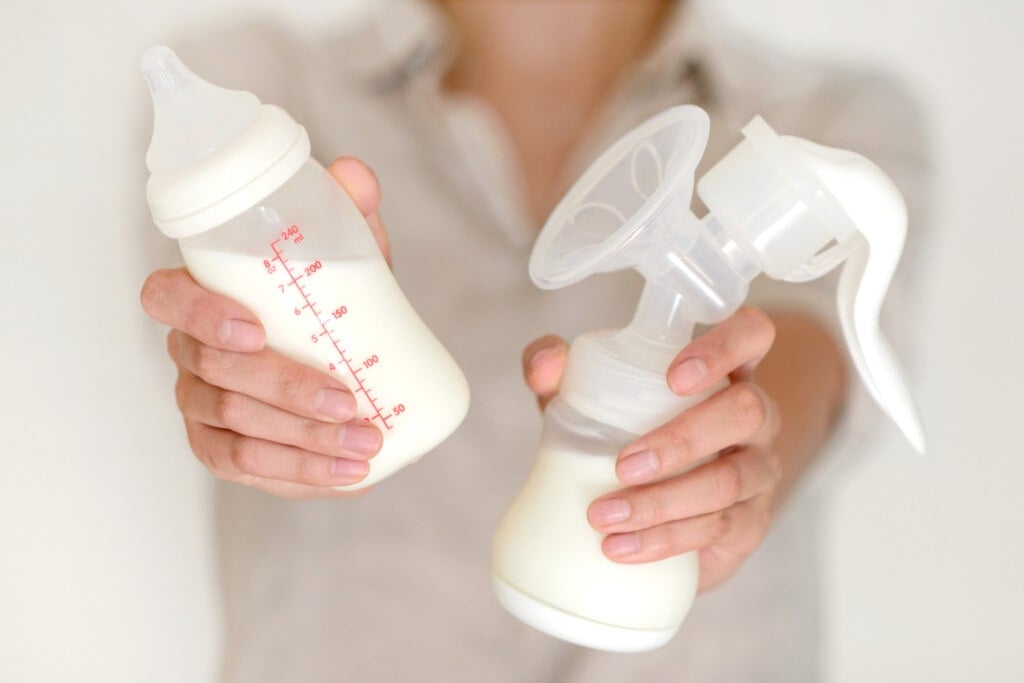This is one mom’s personal story and may not reflect every parent’s experience.
Pumping breastmilk can feel overwhelming for many moms, and I quickly learned it wasn’t right for me.
When you get pregnant, there are a lot of things you agonize over, including whether to breastfeed and what bottles to buy. There are so many choices, and it’s overwhelming. Maybe you’re not even sure you need them, but everything you read says you will at some point. So you grab just a few, just in case. Even if you breastfeed, you may want Dad or Grandma to give the baby a bottle of breastmilk so you can take a break, right?
The Best of Intentions
During pregnancy, I decided to pump and build a milk stash like the pictures I saw on social media. I received many bottles for my baby shower, including a bottle warmer and a drying rack. I ordered my pump while I was still pregnant. And I ensured I had it because, of course, I would pump and give my baby bottles sometimes.
But I did neither of those things.
When Real Life Changed My Plans
I forced myself to pump with my first. I did it twice, maybe three times. And then I never did it again. I hated it. It was time-consuming. It was ineffective, and it took time away from my baby. Time that I could have just been nursing her. Time that I could have been playing with her. It was boring and tedious. Thankfully, I had enough milk and stayed home with her, so making sure she got milk when she needed it was not a problem.
Why I Chose To Stop Pumping
Here are the biggest reasons I decided to stop pumping and why it was ultimately the right choice for us.
It’s Expensive
Pumping can be costly, especially if you don’t have insurance. Even if you have insurance, you may want something different, which can cost several hundred dollars. You will also need nipples, bottles, and extra sanitizing products. Not to mention the cleaning supplies and replacement parts.
It Steals Time
Sanitizing your pump and parts is a long process. Every piece of equipment used to pump, every nipple, and bottle must be cleaned regularly. According to the Centers for Disease Control and Prevention (CDC), you should sanitize your pump whenever it comes into contact with your milk.1 This sanitization process involves taking everything apart and ensuring it gets thoroughly clean and dry.
It also takes additional time to thaw and warm your milk to prepare it for your baby. To thaw breastmilk, leave it overnight in the refrigerator or soak it in warm water. You also need to gently heat it gradually with warm water. Using a microwave is a big risk because you can create hot spots that may burn your baby’s mouth, and you risk destroying nutrients.
Timing Was Never Ideal
Calculating when to pump was also a pain. You have to time it just right to get the most milk and space it out correctly to fool your body. Even then, it did not always work ideally. It just seemed like more work.
My Baby Preferred Nursing
Then, you had to convince the baby that a bottle was what she wanted. It wasn’t. She wanted mommy. She wanted to nurse and cuddle. And she wanted to feel safe and warm. Even though my husband wanted to have the experience of feeding the baby, it just didn’t work out. It was so much more work and seemed like a huge waste of time. I am sorry he missed out on the experience, but my instincts told me that nursing was the best way to go. It was more natural and intuitive, so I followed my feelings. Plus, it would not have been as helpful as it seems. Even if he took over some of the feedings, I still would have had to pump during that same time.
Night Pumping Wasn’t Worth It
You need to wake up at least once during the night to pump. It is really easy to wake up to breastfeed your baby because baby cuddles are great! But waking up to pump may be more of a pain. During the night, prolactin is at its highest.2 Prolactin is a hormone that will help ensure that milk is consistently produced, so it is important to get milk out during this time to maintain production.
The Benefits of Nursing Outweighed Everything
Not only does nursing help you bond with your baby, but there are other benefits as well. The coolest benefit I came across was that your milk will adapt to your child’s needs. When you nurse, your body takes in your child’s saliva. This process sends a message about what your child needs, and your body will change the milk to make that happen.3
In the end, I realized that quitting pumping wasn’t a failure. It was a decision that worked best for me and my baby. Every feeding journey is different. What matters most is that your baby is fed and loved.












